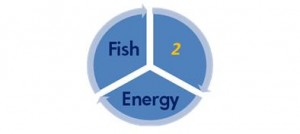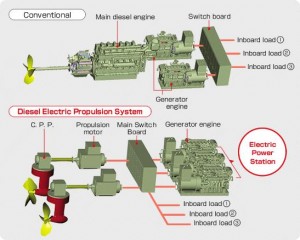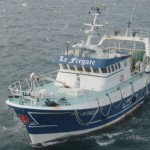Innovative Ships
In 2-Seas, as elsewhere, the Trawler fleet has been, and still currently is, negatively affected by the increase of the fuel price. Fishing enterprises assets do not allow ship owners to provision appropriate funds to renew the fleets. They are so forced to extend the life of their vessels. Conversion options do exist, that offers the possibility of improving vessels’ overall energy consumption.
The conversion to a hybrid gaz/electric driveline allows a traditional diesel engine to be replaced by smaller engines, which are linked to alternators that feed an electric propulsion system and replace the traditional propeller shaft.
This allows an intelligent management of the power, adjusted to the profile during the various phases of the fishing operation. This system divides only the necessary power, whilst the concept of the old trawlers constantly develops the same power at sea as alongside the quay. The conversion to natural gas instead of gasoil will increase the interest for conversion as the price of this fuel, the CO2 and particulate emissions are remarkably lower.
This solution necessitates the down-time of the vessel for the conversion and also demands a adjustment period before full productivity. The weakness of the business does not allow for the diversification of the productivity of the trawler, as the trawler spends 46 weeks at sea per annum. Nothing convinces the ship owner to expose himself to the risk of innovating in such a context.
The activity consists of stimulating the investment in conversion solutions by creating the conditions to allow the first pioneers to go into innovation. This action intends in no single way to pay for the investment of the ship owner, which remains on the entire account of the owner. But it leads to compensate the hazards of exploitation issued by experimental demonstration, once conversion achieved.
The trawler FREGATE, based in Boulogne, is thus utilized as a lever of a first demonstration vessel at real scale with innovative solutions and in real economic business conditions in the hands of a trusted crew enforced by expert technicians, during a significant period of 33 months. To provide this technical assistance is the main project’s purpose, as well as the sharing of the result information with the wider profession, invited to observe the evolution of this demonstration project.
A financial rent aims to offset the potential down-time and hazards generated by the experimentation. The financial losses are compensated with the income derived from the charter and the fish catch and the fuel benefits of the conversion. The process is ensured by a management contract with Cooperative Maritime of Etaples (which is used to manage over 80 fishing trawlers in its fleet). The principle is to guarantee the ship owner in case of failure of the demonstration program to return his vessel to its original condition. The occurrence of use of the 2Seas financial rules of deduction of the revenues out of the FEDER subsidies should be one of the indicators of the success of the project.
What are the main aims of Activity 1 « INNOVATIVE SHIPS » ?
The general goal of action is to break with immobility and impulse a culture of innovation in the 2-Seas fishing sector. To renew the technical practices in fishing and contribute to restart dynamism in investment into fishermen production tools.
More specifically:
Propulsion: To impulse a “cultural revolution” by adapting for the fishing sector the electric gearing, already adopted in other maritime sectors.
Fuels: Experiment immediately an alternative to “only diesel” by introducing natural gas into the drive train.
Consumption: Reduce fuel costs for the enterprise by 35%.
What are the expected results of Activity 1 « INNOVATIVE SHIPS » ?
- Propulsion: To impulse a “cultural revolution” by adapting for the fishing sector the electric gearing, already adopted in other maritime sectors.
- Fuels: Experiment immediately an alternative to “only diesel” by introducing natural gas into the drive train.
- Consumption: Reduce fuel costs for the enterprise by 35%.
- CO2: To apply today the EU targets for marine emissions.


